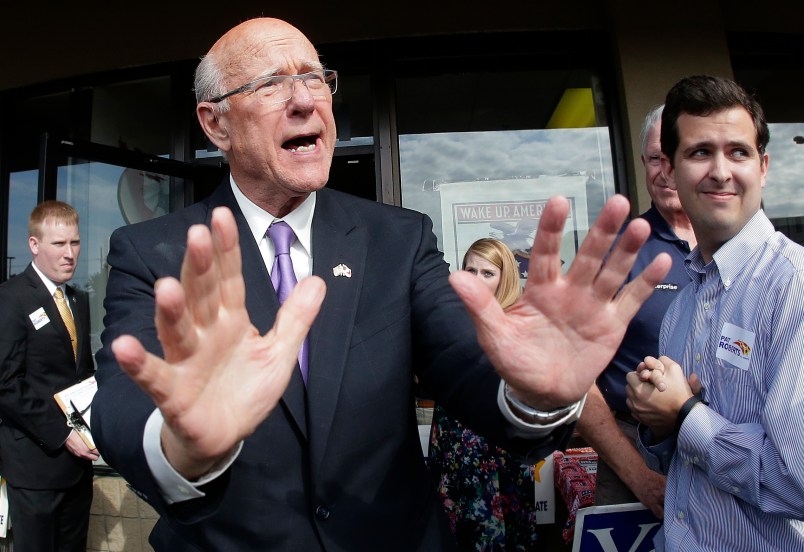Confronted with an unexpectedly robust challenge from independent candidate Greg Orman, Sen. Pat Roberts (R-KS) seems to be playing to the hard right. He has tapped Sarah Palin as a stump surrogate and invoked “national socialism” as recent campaign event.
But is going uber-conservative is the right move for Roberts to save his seat? A new analysis from Gallup suggests it might not be.
Political scientists in Kansas already agree that Orman is competitive — he currently holds a 1-point advantage, according to TPM’s PollTracker average — because he is attracting at least some moderate Republican support. Before former Democratic nominee Chad Taylor dropped out of the race, Orman was endorsed by a group of moderate former GOP state lawmakers.
Now Gallup reported Friday that, among the 10 most Republican states in the Union, Kansas is the most moderate, at least in terms of people who self-identify as moderate.
“Nearly as many Kansans describe their ideology as moderate (36%) as they do conservative (38%), which may be one reason the self-described moderate Orman is performing so well in the polls,” Gallup’s analysts wrote. “The percentage of Kansas moderates is on par with the national figure, but higher than in other conservative-leaning states with key Senate elections this year, including North Carolina and Arkansas.”
About 47 percent of Kansans describe themselves as Republicans — but only 38 percent say they are conservative. Combine the moderates and liberals and 56 percent of the Kansas electorate is to the left of conservatism. Democrats have already schemed to get their voters lined up behind Orman by having Taylor drop out last month and declining to name a new candidate.
Bob Beatty, a Washburn University political science professor, laid out the electoral math to TPM last month. Orman needs to win almost all of the Democrats, a task made easier without any Democrat on the ballot, and a healthy chunk of moderate Republicans and independents to beat Roberts.
“It’s a tough task. It’s never been done,” Beatty said. “It’s doable. It’s just obviously not a slam dunk.”
But the new numbers from Gallup indicate Orman has a large pool of voters to pull from to make it happen.







Roberts is likely toast at this point. The teahadists may not know much, but they can spot a phony as well as anyone.
The unknown factor is the inherent cowardice of low-info voters. They’ll proudly trumpet that they want a change from their philistine leadership, then when it comes down to that one vote, they’ll go with the status quo.
Sen. Pat Roberts (R-KS) seems to be playing to the hard right …
OK - see how that works
Also, at public appearances , recommend ‘Goose stepping’ across the stage -
Kansans have elected Brownback to the Senate and Governorship - I don’t buy this argument that any Republican is “Moderate”.
Hard right conservatives purged the Republican Party in Kansas in the 90s and 00s. Brownback stuck with social issues, and didn’t act crazy enough to scare anybody off in his senate campaigns. When Sebelius left to run HHS, she pretty much gave up the governor’s mansion to Brownback in the subsequent cycle; there was no viable Democrat to replace her.
Long story short, there are moderate Republicans, they just haven’t been empowered in their own party, and haven’t had a good chance to make common cause with Democrats and Independents until this cycle; Brownback’s dancing on the the third rails of Kansas politics has been well documented, and Roberts was permanently damaged in the primary over the residency issue.
Kansas Democrats have made a brilliant strategic move by leaving the senate field to the very popular Orman while concentrating their fire on Brownback. Moderate Republicans have made a brilliant strategic move by openly endorsing a moderate Democrat over Brownback, and leaving Roberts to swing in the wind. If both bets pay off, and especially if Kobach gets knocked off as well, the ultra conservatives control of the Republican party in Kansas will be shattered, and that could well be a model for defeating extremism in other red states.